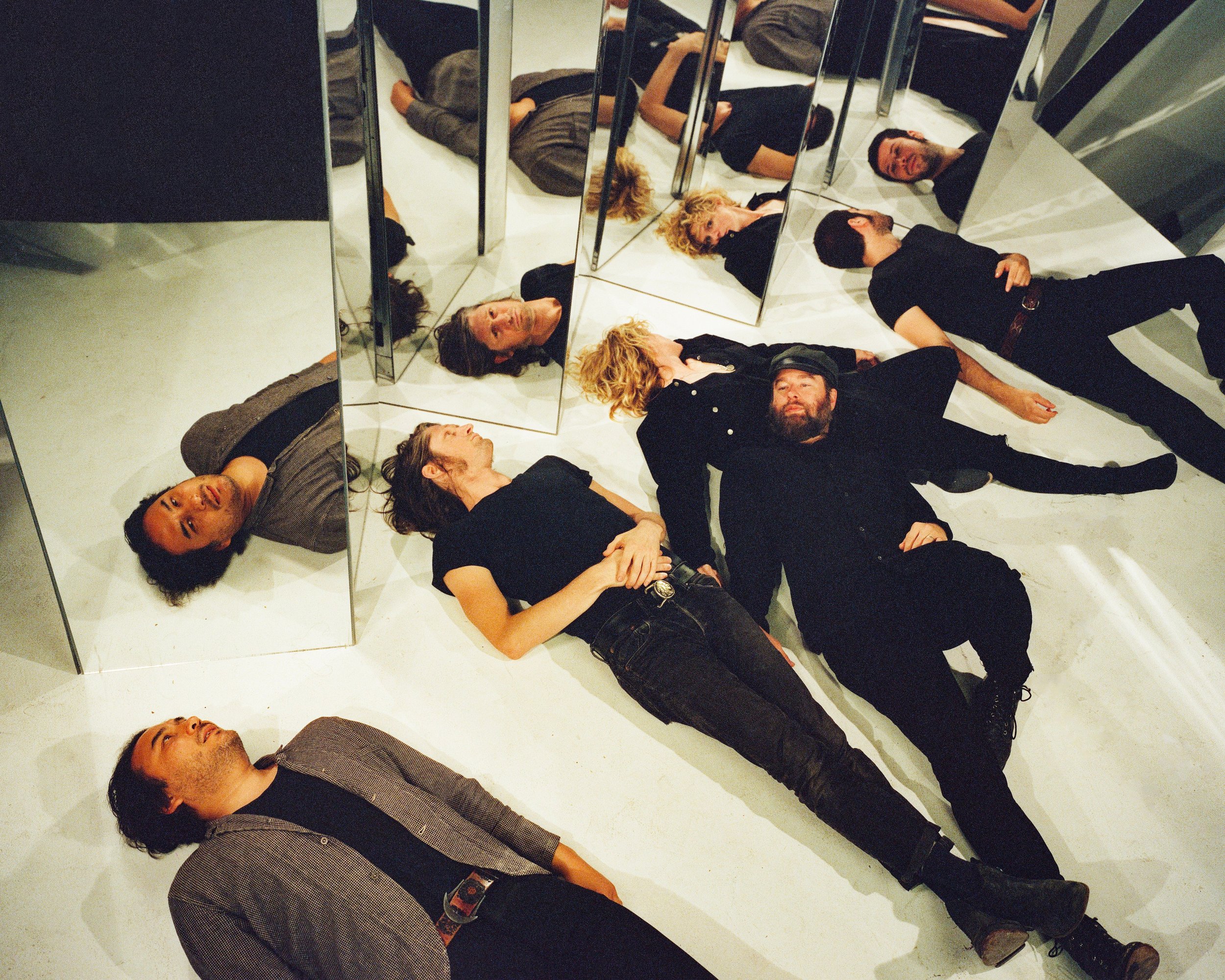Photo credit: Pooneh Ghana
From the perspective of vocalist and multi-instrumentalist Alex Maas, a powerful connection exists between the music he writes and performs with The Black Angels and nature. With the Austin psych-rock quintet releasing their latest music expedition, Wilderness Of Mirrors, Maas reflects on the elements, both innately within him and new to the group, that came together to impact the band’s sixth studio album.
Maas grew up on his family-owned plant nursery, where he spent all of his upbringing. He recalls those earlier years of absorbing the beauty of the Maas Nursery flora and fauna, as some of the most impactful years of his life.
“Looking back on it, it’s this magical place with tons of varieties of species of animals and plants. It’s a little 14-acre piece of land that my grandfather owned and my dad had bought from him, and wanted to make it a destination,” explains Maas. “Just looking back on it, it was this fantastic place to grow up as a child.”
Maas’ relationship with music blossomed in the same space, as he remembered the day his parents put speakers up at the nursery. “Walking through the nursery, I remember hearing Enya’s ‘Orinoco Flow’ or, like, Indigenous music playing through the speakers. My parents just understood that connection and understood that they were trying to make it a true experience.”
He adds, “The feeling of nature and being in nature is the same feeling as creating music and getting to this place, this special place that exists. This place that I try to get back to.”
Through the acknowledgment of that connection, there’s always been an undeniable thread that weaves together those wondrous and elevating feelings inspired by nature and the sounds The Black Angels produce. Just as with nature, there’s a cyclical component that not only brings Maas back to that innocent frame of mind, but becomes evident in the band’s use of tools and tactics utilized by music artists in the late ‘60s, early ‘70s.
“I think there was always something spectacular that was happening in the ‘60s, and in the ‘50s as well, and everything in the ‘70s and beyond, but, you know, the ‘60s specifically, there was just a lot of experimentation happening. And one thing that has led us down this road is some of our favorite bands, like, what gear were they playing? What microphones were they playing out of? How were they recording?”
He continues, “We were looking at these things and just being nerds about it, then, it became about using similar tools and trying to do it in a fresh and more modern way. Starting with those tools and make it feel fresh or try and use them in a way that hasn’t been heard.”
Joined by guitarist Christian Bland, drummer Stephanie Bailey, guitarist Jake Garcia, and multi-instrumentalist Ramiro Verdooren, the band continue to follow their free-spirited, natural flow to produce a sound that’s one of a kind.
With Wilderness Of Mirrors, The Black Angels combine a cornucopia of mesmerizing and mood-altering elements with heavy, honest feelings to create a kaleidoscopic listening experience. While Maas presents his observations and questions, trying to make sense of today’s oftentimes distressing state of humanity, the band layer textures of sound around their rudimentary proclivities.
“With The Black Angels, we want to get our point across without preaching it. We try to encourage people to reinterpret their preconceived notions, think things out yourself, and we try to put a lot of ‘what ifs?’ out there.”
“I think there’s something to that with our band, with some of the things we speak about; we never want to sound too preachy or over political or anything like that. We just want to hold up the mirror to you so you can try and see what is happening from our perspective. Whether it’s true or not, it doesn’t matter. That’s what we’re trying to do; we’re holding up a mirror to whoever’s listening and saying, ‘Hey, this is how we see the world; what do you see in it?’” explains Maas.
The vibrant and full-bodied production on Wilderness Of Mirrors allows for all of its rich details to really come to life. Totaling in 15 tracks, each song has its own unique features. Whether it be the fuzz-laden, catchy buzz of “Without A Trace” or “History of the Future,” the ‘60s French pop homage “Firefly,” the hypnotic repetition of “The River,” the acoustic infusion within both “Here & Now” and “100 Flowers of Paracusia,” or the inescapable energy of “El Jardín.”
“That’s the idea of our band, letting the song develop and us being able to get out of the way of it. If it happens to be a song that goes on this amazing musical journey, that’s wonderful,” explains Maas. “I think the vision was, and always is, to try to evolve and sound fresh and unique. Try to just go places we haven’t gone before. That’s always the idea, and whether we pull that off or not, I’d like to think that our DNA exists in the new album.”
He adds, “Having faith in the people that you’re painting with, they can have a similar palate as you and a different palate that also works, it’s not about all being the same…Bringing your ideas to the band and just having them deconstruct it and turn it into something a thousand times better than what you did originally in your head…it’s just magical to me more than anything.”
With Maas being more of a believer in minimalism, he circles back around to that feeling of being a kid, “going back to those moments where I was like, a four or five year old, what we’re all trying to do is go back to that innocent feeling.”
Watch the video for “El Jardin” here:
